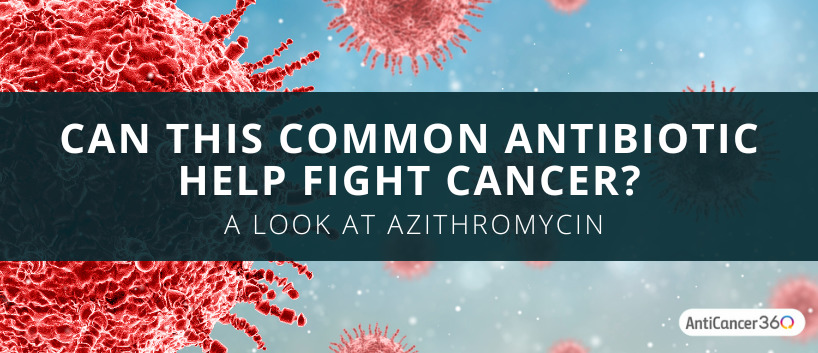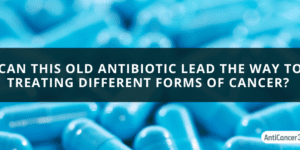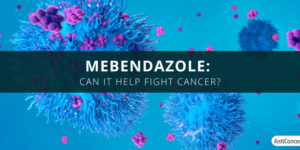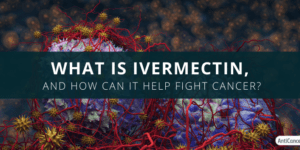Cancer is a difficult obstacle to overcome physically and mentally, no matter the severity. You want to do everything possible to fight and beat it, especially in advanced cases. The good news is that there are many beneficial ways to support your body in fighting cancer in addition to taking your prescribed oncology treatments.
Popular integrative approaches involve adding natural substances, honing your nutrition while limiting sugar intake, and utilizing certain “off-label” medications for potential anticancer benefits. Examples of medications commonly used off-label for this purpose include mebendazole, ivermectin, doxycycline, aspirin, and metformin. Another such medication is azithromycin.
Also known as Zithromax or Z-pak, azithromycin is a commonly prescribed antibiotic. Researchers are studying if this medication might be beneficial against cancer. Read on to learn more about the science behind the anticancer effects of azithromycin and how you may be able to use it to your benefit.
What is Azithromycin?
Azithromycin is an antibiotic used to treat various bacterial infections, such as infections of the ears, skin, eyes, and certain sexually transmitted diseases. It belongs to a class of antibiotics known as macrolides. Other antibiotics in this class are clarithromycin and erythromycin [1].
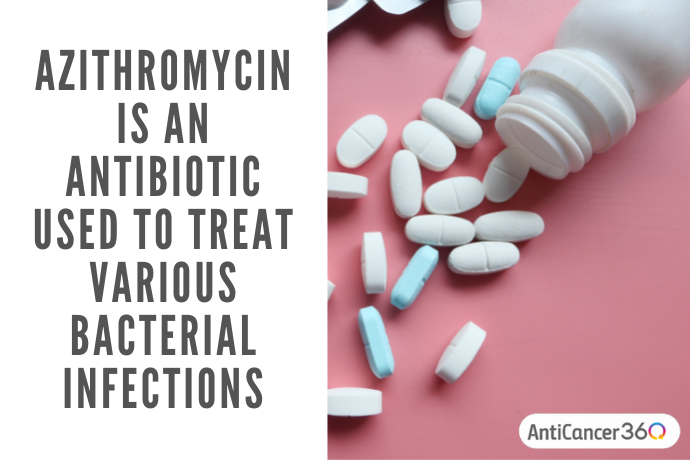
Here is a quick summary of the basic facts about azithromycin:
- Brand names: Zithromax, Zithromax Z-Pak, Azasite
- Generic available: yes
- Drug form: oral tablet, oral suspension, eye drop, intravenous
- Classification: Macrolide antibiotic
- Status in the U.S.: Prescription (Rx)
- Initial FDA approval: 1991
Like ivermectin and doxycycline, azithromycin is another antimicrobial medication that is being investigated for its anticancer effects. Several studies have looked at the synergy between azithromycin and chemotherapy. Additional research was dedicated to how azithromycin as a stand alone treatment fights cancer at the cellular pathway level.
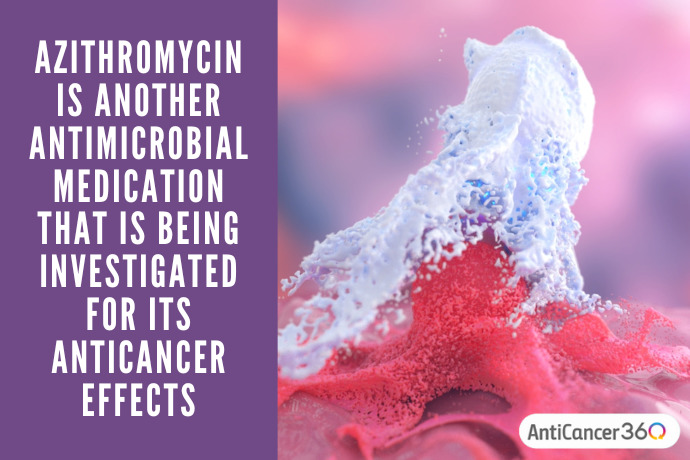
Let’s take a closer look at the science behind azithromycin and its potential as an anticancer agent.
Potential Anticancer Effects of Azithromycin
Cancer cells use a variety of mechanisms to maintain their survival, growth, and resistance to chemotherapy. Knowing that cancer cells have developed these adaptive mechanisms to enhance their survival, it is crucial that new research and development programs continue to design novel therapies to stop these survival pathways.
Azithromycin and Autophagy
Many research studies have shown that cancer cells rely on a process called autophagy to support their growth and survival. Autophagy is the cell’s way of recycling certain internal parts or repurposing them in order to sustain the cell under different environmental conditions. Autophagy also contributes to the cancer cell’s ability to shield or protect themselves from chemotherapy.
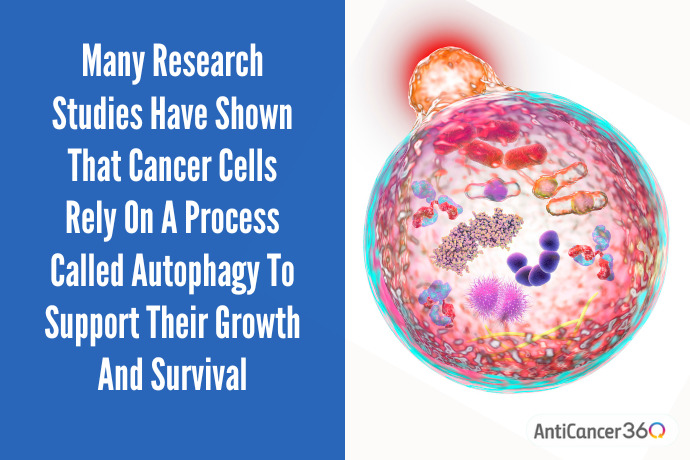
One specific feature of autophagy that benefits cancer cells is the subsequent cellular protection against anti-cancer drugs. Autophagy enables cancer cells to sustain a state of dormancy or inactivity. Think of it like hibernation for the cell. In this state, cancer cells are able to avoid detection by the immune system and also dodge the effects of anticancer drugs that target rapidly dividing cells (such as chemotherapy).
So, autophagy in cancer cells has become a popular target in fighting cancer. Previous preclinical research has demonstrated that macrolides, such as azithromycin, can have a strong inhibitory (blocking) effect on autophagy. A recent study looked at the effect of combination therapy of DNA-damaging drugs and azithromycin in a non-small-cell lung cancer cell line (NSCLC). This cell line was treated with a chemotherapy drug (either doxorubicin, etoposide, gemcitabine, or carboplatin) with or without azithromycin [2].
The findings revealed that the addition of azithromycin to doxorubicin, etoposide, or carboplatin resulted in higher cancer cell death compared to cells treated with chemotherapy alone. Additionally, the results suggested that the combination of azithromycin and chemotherapy increased cellular production of certain proteins involved in apoptosis (cell death).

Notably, this study showed that azithromycin could inhibit autophagy and enhance the cytotoxicity of chemotherapy. In response to treatment with chemotherapy alone, the cancer cells increased the amount of proteins and by-products involved with autophagy. However, when azithromycin was added in combination with each chemotherapy, there was a buildup of those same proteins, which the cancer cell could not use. Since cancer cells were unable to undergo autophagy, the DNA-damaging chemo was able to quickly kill the cells faster than it could have without the azithromycin.
Frequently Asked Questions About Azithromycin
Next we’ll cover some of the commonly asked questions we receive about azithromycin and cancer.
Can azithromycin cure cancer?
Unfortunately, no, azithromycin cannot cure cancer in humans.
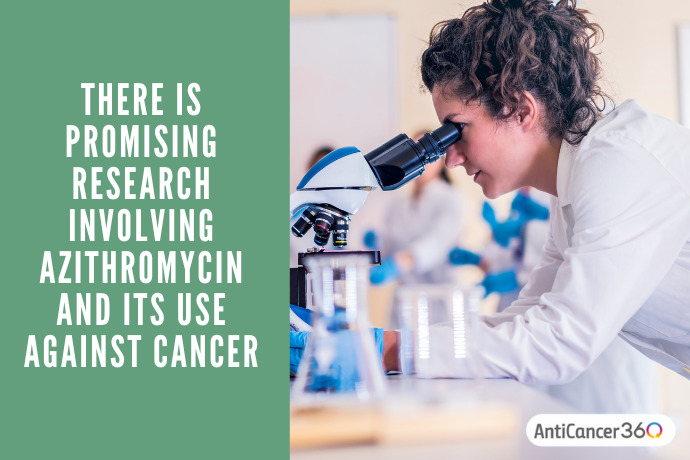
There is, however, promising research involving azithromycin and its use against cancer. One preclinical study shows that azithromycin and vincristine may work together against cervical and gastric cancer [3]. Other studies show that azithromycin works synergistically with a promising cancer therapeutic known as TRAIL and can attack cancer stem cells [4],[5].
What are the side effects of azithromycin?
While taking azithromycin, adverse effects can occur. Common side effects include abdominal pain, diarrhea, flatulence, nausea, vomiting, increased liver enzymes, headache, and vision changes [6].
Serious adverse effects can happen but are rare. Severe side effects may include but are not limited to heart arrhythmias (such as prolonged QT interval and Torsades de pointes), serious allergic reactions such as Stevens-Johnson syndrome and toxic epidermal necrolysis, and liver problems [7].
What is the dosage of azithromycin for cancer?
Since azithromycin is not FDA-approved for cancer, there isn’t a specific dose advised for this purpose. More research is needed to establish an optimal dosage of azithromycin in people with cancer. All referenced material in this article refers to pre-clinical studies completed in various cell lines.
Azithromycin comes in several strengths and forms, such as tablets, powder for suspension, intravenous formulations, and ophthalmic solutions. If you take azithromycin oral tablets or the liquid suspension, you should avoid concurrent use of aluminum or magnesium-containing antacids [8]. Your practitioner can tell you more about the dosage that’s safe for you as well as any interactions that may affect you.
Can Azithromycin Help in the Fight Against Cancer?
Overall, you can see that there can be many potential benefits to adding azithromycin to your anticancer program. And when you’re fighting cancer, you want every possible tool in your toolbelt, which may include repurposed or “off-label” pharmaceutical drugs.
Be sure to discuss the potential benefits and risks of azithromycin with a member of your treatment team. Note that azithromycin is a prescription-only drug in the United States. If your healthcare provider agrees that azithromycin is safe for you, they may consider prescribing it. They’ll also advise you on the proper dosage of azithromycin and any drug interactions to be aware of.

Ultimately, when using an Aggressive Integrative Approach to cancer, the goal is to fight cancer from every possible direction. This practice includes integrating repurposed medications and natural supplements to fight cancer in an evidence-based, safe way that shouldn’t interfere with your oncology treatment.
How are you approaching your cancer treatment? Are you integrating any natural supplements or strategic dietary approaches? Have you tried azithromycin or any other off-label medicines for cancer? Please feel free to share your experience or feedback in the comments below!
Are You A Good Candidate For Our Program?
If you’d like to learn more about the AntiCancer360 approach and see if we can help you, please watch our free online webinar to learn more. At the end, you’ll be able to schedule a free call with our team so that we can discuss your case in detail.
Medical Disclaimer: The information in this article is meant for educational purposes only. It is not intended to replace a healthcare provider’s medical advice, diagnosis, or treatment. Consult a healthcare practitioner before taking any new medications or supplements.
Dr. Andrew Cox is a graduate of the University of Pittsburgh and is part of the AntiCancer360 team as a consultant pharmacist and medical writer. He received his Bachelor’s degree in Biology from Marist College and a Master of Arts in Cell Biology from Villanova University prior to completing his Doctor of Pharmacy at Pitt. He also completed his Masters of Business Administration from the University of Maine. His expertise helps us create safe herbal and supplement combinations and avoid potential drug interactions.
Andrew has been a licensed pharmacist since 2013 with experience in outpatient retail pharmacy, long term acute care, and managed care pharmacy. He is interested in the appropriate utilization of natural substances to effectively prevent and treat cancer in addition to the traditional treatment strategies. He is also interested in the research and the latest findings of the mechanisms by which various natural compounds affect the tumor microenvironment
In his free time, Andrew enjoys traveling, reading, and the Premier League games on the weekends. He resides in Pittsburgh, Pennsylvania with his wife, daughter, and a boxer mix named, Party Martie.

